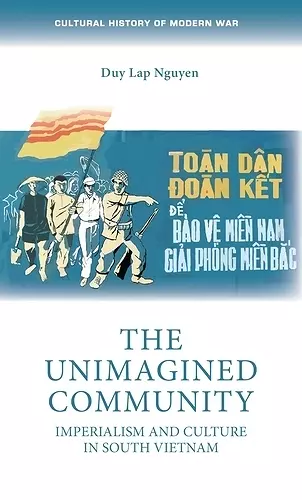The Unimagined Community
Imperialism and Culture in South Vietnam
Format:Hardback
Publisher:Manchester University Press
Published:5th Dec '19
Should be back in stock very soon

The unimagined community proposes a reexamination of the Vietnam War from a perspective that has been largely excluded from historical accounts of the conflict, that of the South Vietnamese. Challenging the conventional view that the war was a struggle between the Vietnamese people and US imperialism, the study presents a wide-ranging investigation of South Vietnamese culture, from political philosophy and psychological warfare to popular culture and film. Beginning with a genealogy of the concept of a Vietnamese “culture,” as the latter emerged during the colonial period, the book concludes with a reflection on the rise of popular culture during the American intervention. Reexamining the war from the South Vietnamese perspective, The unimagined community pursues the provocative thesis that the conflict, in this early stage, was not an anti-communist crusade, but a struggle between two competing versions of anticolonial communism.
'In The Unimagined Community: Imperialism and Culture in South Vietnam, Duy Lap Nguyen has dissolved the entrenched stereotype of Ngô Ðình Diem and developed an analysis of his thought, aims, policies, and opponents that is fresh and convincing, meanwhile subverting prevailing interpretations of modern Vietnamese history. He also develops a fresh analysis of American and South Vietnamese relations in the post-Diem era.'
H-Asia
'A wide-ranging work of original historical research, critical theory, and cultural criticism, this volume by Nguyen (Univ. of Houston) reexamines the political and cultural history of the Vietnam War from the largely excluded perspective of the South Vietnamese. Disputing the widely held representation of the war as a contest between Vietnamese people and US imperialism, The Unimagined Community provocatively argues that, in its early stage, the war was not an anti-communist crusade but a struggle between two competing versions of anti-colonial communism. Providing an extended analysis of the culture of the early South Vietnamese republic, ranging from its political philosophy and psychological warfare to its popular culture and films, the book deftly shows that the war was a contest between two Vietnamese states that embraced two different conceptions of communism: one based on the dictatorship of the proletariat and the other on socialism without the state. Nguyen convincingly argues that in its nine years of existence, the early South Vietnamese state sought to establish a Marxist, humanist nation that favored a stateless form of democracy and rural autonomy—a remarkable political experiment against both capitalism and liberal democracy.' (Reprinted with permission from Choice Reviews. All rights reserved. Copyright by the American Library Association.)
Y. L. Espiritu, University of California San Diego
'In The Unimagined Community: Imperialism and Culture in South Vietnam, Duy Lap Nguyen has masterfully brought together a range of sources to not only contest nationalist historiographies but critically investigate the immediate post independence history of South Vietnam, in particular the first republic and its leaders’ visions for the future.'
The Journal of Asian Studies
'A wide-ranging work of original historical research, critical theory, and cultural criticism, this volume by Nguyen (Univ. of Houston) reexamines the political and cultural history of the Vietnam War from the largely excluded perspective of the South Vietnamese. Disputing the widely held representation of the war as a contest between Vietnamese people and US imperialism, The Unimagined Community provocatively argues that, in its early stage, the war was not an anti-communist crusade but a struggle between two competing versions of anti-colonial communism. Providing an extended analysis of the culture of the early South Vietnamese republic, ranging from its political philosophy and psychological warfare to its popular culture and films, the book deftly shows that the war was a contest between two Vietnamese states that embraced two different conceptions of communism: one based on the dictatorship of the proletariat and the other on socialism without the state. Nguyen convincingly argues that in its nine years of existence, the early South Vietnamese state sought to establish a Marxist, humanist nation that favored a stateless form of democracy and rural autonomy—a remarkable political experiment against both capitalism and liberal democracy.'
Choice
(Reprinted with permission from Choice Reviews. All rights reserved. Copyright by the American Library Association.)
ISBN: 9781526143969
Dimensions: 216mm x 138mm x 17mm
Weight: 490g
296 pages